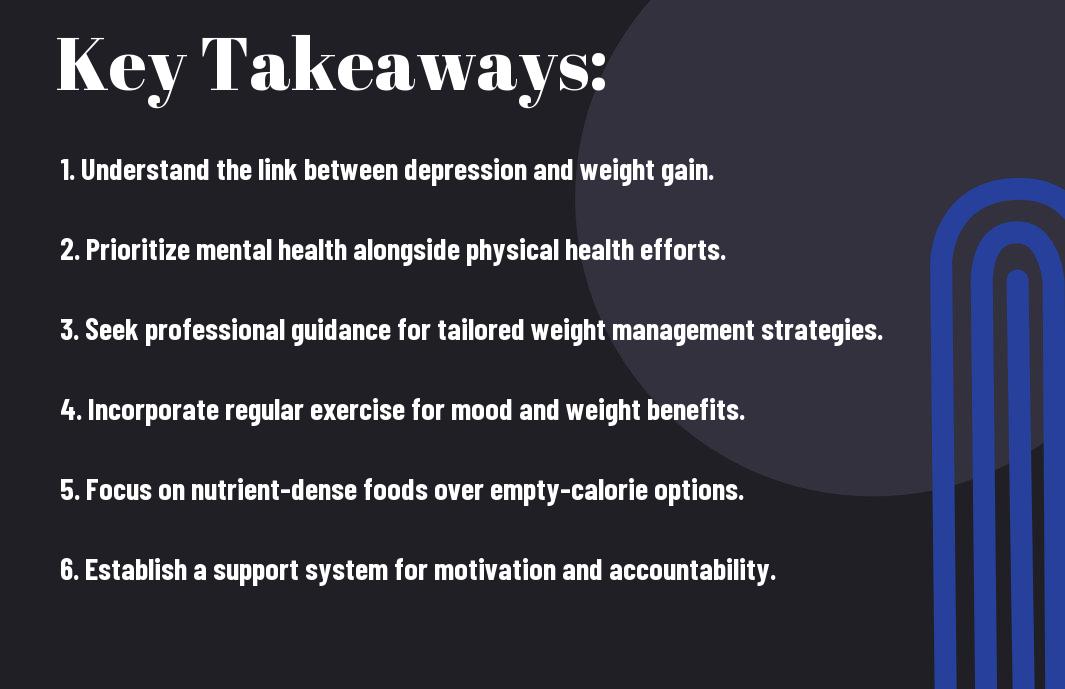You may find that depression affects not only your mood but also your physical health, leading to unwanted weight gain. Understanding the connection between emotional well-being and changes in your body is necessary for you to take control of your situation. By exploring effective strategies for managing weight gain linked to depression, you can adopt healthier habits and improve your overall quality of life. This guide will provide you with practical tips and insights to help you navigate these challenges with greater confidence.
Key Takeaways:
- Understand the connection: Recognize that depression can influence eating habits, leading to weight gain due to changes in appetite and emotional eating.
- Seek professional help: Engage with healthcare providers for tailored support, including therapy or medication, to address both depression and weight management.
- Maintain a balanced diet: Focus on a nutritious diet rich in fruits, vegetables, whole grains, and lean proteins, which can improve mood and overall health.
- Incorporate physical activity: Regular exercise not only supports weight management but also boosts mood and reduces anxiety, benefiting overall mental health.
- Practice mindfulness: Techniques such as meditation and yoga can help manage stress and promote a healthier relationship with food.
- Establish a routine: Creating a structured daily schedule can improve stability, helping to mitigate emotional eating and promote healthier choices.
- Connect with support groups: Sharing experiences with others facing similar challenges can provide emotional support and valuable strategies for managing both depression and weight gain.
Understanding the Connection Between Depression and Weight Gain
For many individuals, the relationship between depression and weight gain can be alarming and perplexing. You may find that your emotional state significantly influences your eating habits and motivations, leading to unintended weight changes. Understanding this connection is imperative for effectively managing your health and wellness during difficult times.
Biological Factors
Connection between depression and weight gain often involves various biological factors. Changes in brain chemistry, particularly in neurotransmitters like serotonin and dopamine, can lead to shifts in appetite and metabolism. Some key factors include:
- Altered hormone levels
- Increased cravings for high-calorie comfort foods
- Reduced physical activity due to low energy
Knowing these biological influences can help you tackle weight management more effectively.
Psychological Impact
Behind the emotional fog of depression, you might find that psychological factors play a significant role in weight gain. Emotional eating phenomena manifest as a way to cope with negative feelings, leading to binge eating or a preference for unhealthy comfort foods.
With the challenges of depression, you may often turn to food for solace, seeking temporary relief from feelings of sadness or anxiety. This tendency can create a feedback loop, where weight gain further exacerbates feelings of worthlessness or self-criticism, intensifying depressive symptoms. Understanding your psychological triggers can equip you with tools to break this cycle and promote healthier coping mechanisms.

Behavioral Patterns Contributing to Weight Gain
One of the key behavioral patterns that can lead to weight gain during depression is the tendency to engage in emotional eating. When feelings of sadness and hopelessness arise, you might find yourself seeking comfort in food, leading to an increase in calorie intake. To understand and manage this behavior, consider exploring resources like Controlling Weight Gain in Patients With Major Depressive Disorder.
Changes in Eating Habits
About half of individuals dealing with depression report significant changes in their eating habits. This can manifest as either increased consumption of unhealthy foods or a complete loss of appetite. Monitor your eating patterns and identify triggers that prompt overeating or skipping meals to regain control over your nutritional habits.
Reduced Physical Activity
Any reduction in physical activity can significantly contribute to weight gain during depressive episodes. Lower energy levels and lack of motivation often lead you to be less active, making it easier to gain weight. Regular movement may feel overwhelming, but even small changes can help you gradually reintroduce exercise into your routine.
Also, a sedentary lifestyle exacerbates feelings of fatigue and lethargy, creating a cycle that is tough to break. To combat this, you can set achievable physical activity goals, like short walks or simple home exercises, which can positively influence both your physical and mental well-being over time.

Strategies for Managing Weight During Depression
After recognizing the connection between depression and weight gain, it’s imperative to implement strategies that help you regain control. These strategies may include nutritional adjustments, incorporating physical activity, and establishing a supportive routine. By taking proactive steps, you can effectively manage your weight while addressing the underlying emotional challenges that come with depression.
Nutritional Recommendations
Any dietary changes should focus on whole foods, such as fruits, vegetables, lean proteins, and whole grains. Limiting processed foods high in sugars and unhealthy fats can enhance your mood and energy levels. Additionally, practicing mindful eating allows you to develop a healthier relationship with food, ensuring that your meals nourish both your body and mind.
Incorporating Physical Activity
Recommendations for physical activity vary according to your current fitness level, but starting with gentle exercises like walking or yoga can significantly boost your mood and energy. Aim for at least 150 minutes of moderate activity each week. As you progress, explore different types of exercises to find what you enjoy, making it easier to stay active consistently.
Due to its numerous psychological benefits, incorporating physical activity into your daily routine can help alleviate symptoms of depression. Regular exercise promotes the release of endorphins, which can improve your mood and reduce stress. It can also establish a sense of accomplishment, helping to lift your spirits. To make this easier, consider exercising with a friend or joining a group, as social support can enhance motivation and commitment to your fitness goals.

Seeking Professional Help
Many individuals facing weight gain due to depression may find it beneficial to seek professional help. Engaging with a qualified therapist or counselor can provide you with the necessary tools and support to address both your mental health and weight management goals. A professional can guide you in exploring the underlying issues driving your depression, thus aiding in the development of effective coping strategies that promote overall well-being.
Therapy Options
On your journey toward managing weight gain linked to depression, exploring various therapy options can be advantageous. Cognitive-behavioral therapy (CBT) is particularly effective, as it helps you identify negative thought patterns and behaviors that contribute to both depression and unhealthy eating habits. Additionally, group therapy can provide a supportive environment where you can share experiences and learn from others facing similar challenges, fostering a sense of community and accountability.
Medication Considerations
Across the spectrum of managing depression, medication may play an important role in your treatment plan. Antidepressants can help stabilize your mood, allowing you to better engage with therapy and lifestyle changes aimed at weight management. It’s important to discuss with your healthcare provider the potential side effects of medications, as some can lead to weight gain. By working together, you can find the right balance that manages your symptoms while considering your health goals.
Therapy options often complement medication in managing depression and weight gain effectively. You should consult with your doctor regarding any existing medications that could be impacting your weight. In some cases, switching to a different antidepressant can alleviate unwanted weight gain while still providing the necessary support for your mental health. Always approach medication adjustments with your healthcare professional to ensure that this aspect of your treatment is aligned with your individual health needs and weight management objectives.

Building a Support System
Now, it’s vital to cultivate a support system that understands your struggles. A network of friends, family, or professionals can provide the encouragement you need to overcome challenges related to weight gain during depressive episodes. If you want to explore further insights, check out Depression and Weight Gain: All You Need to Know.
Importance of Social Support
Against feelings of isolation, social support offers a buffer that can significantly improve your overall well-being. Surrounding yourself with people who validate your experiences and reinforce positive behaviors helps lay the foundation for your journey towards better emotional health.
Group Therapy and Support Groups
With group therapy, you gain the opportunity to connect with individuals facing similar struggles, allowing you to share experiences and coping strategies in a safe environment. These gatherings can foster a sense of community, helping you feel less alone in your battle against depression and weight gain.
Consequently, group therapy and support groups provide a structured format where you can express emotions and learn effective coping techniques. Sharing your journey in a collective space helps normalize your experience and builds resilience. Engaging with others who truly understand your challenges can lead to meaningful connections, and through support, you can achieve a healthier state of mind and body.
Mindfulness and Self-Care Practices
Not only can mindfulness help you cope with depression, but it can also play a significant role in managing weight gain associated with medication. Engaging in mindfulness can help you become aware of your eating habits and emotional triggers. To understand more about how medications, like antidepressants and weight gain: what causes it?, you can explore resources that research into these connections.
Stress Management Techniques
About 50% of weight gain during depression can be attributed to stress, which affects your hormonal balance and cravings. By implementing stress management techniques such as deep breathing, yoga, or meditation, you can reduce emotional eating and restore a sense of control over your body.
Establishing Healthy Routines
By creating a daily routine that incorporates healthy habits, you can counteract weight gain related to depression. Prioritize regular exercise, balanced meals, and adequate sleep to promote energy and overall well-being. Consistency in these practices can significantly help in managing both weight and mood.
Practices that establish healthy routines can transform your lifestyle. Start small by setting achievable goals for your daily diet, exercise, and self-care. Gradually build these habits to ensure they fit into your life, making it easier to maintain motivation and see lasting results. Over time, these routines will become second nature, supporting both your mental health and physical wellness.
To wrap up
Drawing together the insights discussed, managing weight gain caused by depression requires a holistic approach that addresses both your mental and physical health. You can benefit from adopting healthy eating habits, engaging in regular physical activity, and seeking support from mental health professionals. Prioritize self-care and be patient with yourself as you navigate this journey. With the right strategies and support, you can work towards achieving a healthier balance in your life.
FAQ
Q: How can depression lead to weight gain?
A: Depression can lead to weight gain for several reasons. Individuals may experience changes in appetite, resulting in overeating or cravings for high-calorie comfort foods. Additionally, depression can decrease motivation for physical activity, leading to a more sedentary lifestyle. Hormonal changes associated with depression may also affect metabolism, contributing to weight gain.
Q: What are some effective strategies for managing weight gain related to depression?
A: Managing weight gain due to depression can include a blend of diet, exercise, and mental health support. Adopting a balanced diet rich in whole foods can help regulate appetite and improve mood. Regular physical activity, even in small increments, can boost endorphins and may promote weight loss. Seeking therapy or support groups can also address underlying emotional issues that contribute to both depression and weight gain.
Q: Is it advisable to focus on weight loss while dealing with depression?
A: While managing weight is important, it’s important to prioritize mental health first. Focusing solely on weight loss may lead to additional stress or feelings of failure. It’s often more beneficial to adopt healthy habits and address the emotional aspects of depression before setting specific weight loss goals. This can foster a more sustainable and positive approach to both weight management and mental well-being.
Q: Are there specific foods that can help alleviate symptoms of depression?
A: Certain foods may help support mood and overall mental health. Incorporating omega-3 fatty acids found in fish, walnuts, and flaxseeds can be beneficial. Foods rich in antioxidants, such as fruits and vegetables, may also have a positive effect. Additionally, whole grains and protein sources can stabilize blood sugar levels, which can influence mood. It’s advisable to minimize processed foods and sugar, which can lead to mood swings.
Q: How can physical activity help with both depression and weight management?
A: Physical activity is known to release endorphins, which can enhance mood and provide a natural relief from symptoms of depression. Regular exercise helps regulate appetite and can boost metabolism, making it easier to manage weight. Engaging in activities that are enjoyable, such as dancing, walking, or group classes, can also create a social connection, which is beneficial for those dealing with depression.
Q: Should I consult a healthcare professional if I’m struggling with weight gain and depression?
A: Yes, consulting a healthcare professional is highly recommended. A doctor or mental health specialist can provide personalized guidance on managing both depression and weight gain. They can also rule out any underlying medical issues, suggest suitable treatment options, and help develop a comprehensive plan tailored to your needs, including therapy, medication, or dietary changes.
Q: How can mindfulness and stress management techniques assist with weight management in the context of depression?
A: Mindfulness and stress management techniques, such as meditation or yoga, can be effective in reducing anxiety and improving emotional well-being. These practices can help individuals become more aware of their eating habits and emotional triggers related to food. By fostering a sense of calm and self-awareness, one may be less likely to engage in emotional eating, facilitating healthier choices and better weight management.





